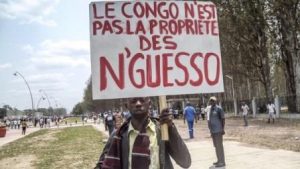A protester displays a placard which says “The Congo is not the property of N’Guesso.”
The most important in this week’s headlines out of and concerning Africa, for those who need help catching up.
This week we look at a story with concerns for Africa’s dwindling middle class, an editorial reminds Obama about his own statements, a big headline about a Canadian first, and another African leader attempts an extension of his time in office.
1. African middle class may be disappearing, according to The Economist
The Economist magazine prognosticates about an emerging African middle class even while it remains thin.
In Few and far between, the magazine cites sources from Oxford University, the Pew Research Center, as well as the Brookings Institution to back up an assertion that “Africans are mainly rich or poor, but not middle class.”
The Economist digs in by trying to understand why this is the case after a decade of economic growth in the continent which it says is faster than population growth. It outlines several reasons for this, one of them being that the proceeds from economic growth are not shared equally.
“In recent years inequality has increased alongside growth in most parts of Africa.”
2. A Somali immigrant wins a seat in Canada’s parliament
There is this story from Global Voices Online about a Somali immigrant who is now a member of the Canadian parliament. It’s the news about Ahmed Hussein who left Somalia in 1993, arrived in Canada as a refugee, worked at low-paying jobs, saved money for school, studied hard, and eventually made his way to positions of leadership and to the Canadian parliament.
Hussein was “voted in with the Liberal’s sweeping victory which took leader Justin Trudeau to power as Canada’s next prime minister,” according to Quartz Africa.
3. After deployment of U.S. troops, Cameroon newspaper sends a reminder to Obama
A few days after the United States began the deployment of troops to Cameroon, one of the country’s English language newspapers, the Cameroon Daily Journal came out with an editorial, telling U.S. President, Barack Obama that the crucial help the country needs is to get rid of Cameroon’s president, Paul Biya.
While praising the actions of Obama in what it calls a “timely patronage,” the paper reminds Obama about a recent speech he gave in Ethiopia during which he questioned the wisdom of African leaders who do not want to relinquish power after decades in power.
The editorial concludes by stating: “Sending a hundred thousand troops to Cameroon will not give Cameroonians jobs. It will not stop Cameroonians running away from their own gov’t.”
Meanwhile the same paper, considered to be leaning towards the country’s opposition, cites sources from the Social Democratic Front (SDF) party, which say the move by the Biya administration to admit U.S. troops was done without consultation with the country’s parliament and in violation of the Cameroon constitution.
4. In the Congo, a vote will decide the future of President Denis Sassou Nguesso
Voters went to the polls on October 25 to decide if the African nation of Congo should allow a constitutional amendment to give long-serving leader Dennis Sassou Nguesso another chance to be president of the country.
The 72-year-old leader has already been in power for more than 30 years and the attempt to stay in power has already sparked protests in the country, according to Aljazeera news.
In Congo vote highlights African democracy, the Financial Times states:
“The outcome of Sunday’s referendum is being watched closely across the region because other leaders whose commitment to democracy has been questioned, notably Paul Kagame in Rwanda and Joseph Kabila in the Democratic Republic of Congo, appear to want to follow Mr Sassou Nguesso’s lead.”

